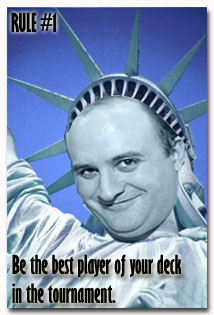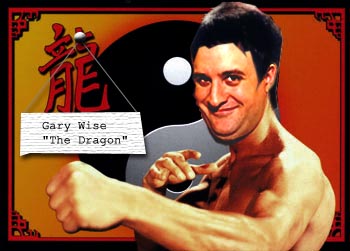
“Wouldn't it be good to be on your side? The grass is always greener over there.”- Nik Kershaw.
Nik Kershaw was a musician of the 80's whose songs often echoed the truths of human experience. The above quote serves as proof. After all, we always want that which we don't have. Are you a professional poker player? Maybe you long for the structure and security of a 9 to 5 job. Are you married with kids? Maybe you miss the days when you could live by your own schedule and spend your money on your desires instead of other's needs. Do you play on the PC? Well, then maybe you think that taking a job where you get paid to write about the game is paradise.
At
PC NY, I learned that the grass on my side of the PC coverage game is green and lush, and my shoes are mighty comfortable.
If you followed
Metagame.com's coverage of PC NY, you might have noticed in
Ted Knutson's excellent blog-based ramblings that, instead of taking my usual perch at the keyboard, I joined some 300 players at the tables to participate in the Pro Circuit. It was a strange place to be and the results are worth looking at¾if you can learn from my example, maybe you won't need to repeat my mistakes.
I believe there are a number of rules that should govern a player's tournament life regardless of a tournament's level. I've developed these rules through playing in over 40 professional tournaments featuring “that other TCG”. Today, I want to focus on just one of them.
Be the best player of your deck in the tournament.

One thing I found shocking about the NY metagame was the sheer number of Sentinels players at the tournament. Was Sentinels the best deck at
PC NY? Absolutely. Anyone who denies that isn't being realistic. There were decks that could consistently beat Sentinels, but those decks severely punished a player for the slightest misstep.
Sentinels was amazing in the NY-era metagame because all the player had to do was play the curve and stay alive for Magneto and
Bastion. More times than I could count, I heard players complaining, “My deck should beat Sentinels,” after taking a loss, but if the Top 8 showed us anything, it's that no deck could actually beat Sentinels when the machines were played correctly. If your testing showed otherwise, your Sentinels player was probably doing something very, very wrong.
Unlike just about everyone in attendance, I decided to play X-Stall. I knew this decision was questionable. The odd expressions that appeared on others' faces every time I mentioned what I was playing were indicative of a less-than-extraordinary deck choice. However, I stuck by my decision for two reasons.
1. It's better to spend energy on figuring out how to play your deck than on figuring out which deck to play.
2. I'm comfortable playing X-Stall because I've played it far more than I've played any other deck.

Dean Sohnle has shown us the importance of deck knowledge. I think that he's the first of a wave of Vs. players who are going to dominate the game because of superior deck knowledge. I had a Sentinel deck completely built, free of proxies and therefore free of the pre-tournament rush-to-get-60-cards-I-don't-own-only-to-lose-track-of-who-owns-each-one burden. However, I knew that to play the robots would mean mirror matches. And after that, mirror images of those mirror matches. Eventually, I'd feel like Bruce Lee in a scene from Enter the Dragon, facing a thousand images of myself with no idea which way to turn.
If I played Sentinels, could I beat a random player playing a randomly awful deck? Sure. Could I beat Dave Spears, Adam Bernstein, or any of the other players who'd been playing Sentinels six times longer than I'd been playing Vs. System seriously? Well, the answer to that question starts with an “n” and ends with an “o.”
My belief is that when you pay airfare, hotel costs, and New York prices for food, transportation, and post-tournament entertainment, your goal has to be victory. Not just making Day 2 or simply finishing in the money, but winning the whole tournament. It's that $40,000 check that justifies those expenditures if you're a student, a poverty-stricken writer, or anyone who doesn't smoke $100 bills in lieu of cigars. Sure, we're all coming out for the good times, but many a good time can be had locally. You owe it to yourself to try to win, and you're not going to do that if you're repeatedly playing a mirror match that you can't win more than 50 percent of the time.
In the three weeks before Pro Circuit New York, I'd won two minor tournaments playing X-Stall and finished second in a third. I'd learned the deck well enough to make changes to the standard decklists. I'd found a friend and capable gamer in Jason Grabher-Meyer, with whom I could have meaningful and intelligent discussions on the archetype that we'd both come to enjoy. I'd beaten Osyp Lebedowicz, Eugene Harvey, Adam Horvath, and the rest of Team TOGIT in assorted matchups against assorted archetypes in our pre-tournament warm ups. Overall, I developed a confidence with the deck that made me feel like I could play the game in a style that didn't involve four or five mistakes per turn. Confidence is key. That's what made the choice an easy one.
The tone for my tournament was set with my first-round pairing against Jeremy Pinter, who has likely played something like 300,000 more games with X-Stall than I have. Jeremy was definitely more aware of what was going on than I was, and despite needing a final-turn, extra-time topdeck to win, he surely felt like he was playing a better game than I was. Naturally, Jeremy was playing Sentinels and he made Day 2, while I finished Day 1 with a 5-7 record. That, in large part, is why I write more about overall tournament strategy than individual deck tech- but I'd bet that a good number of Jeremy's losses were either to the mirror or to decks built to beat him. I can't help but wonder how he'd have fared if he'd busted out a few third-turn Wolverines.
Having only played Vs. System seriously for a month, I can't help but wonder how much better I might have fared if I had played Sentinels, Mutant Nation, or any of the other decks at my disposal. The truth is that there were a lot of players at New York who were simply better than I was at the game. I still need to ask dumb rules questions for verification at times and annoy the judges in other ways, but in the end, I'm confident that I made the right choice. It's up to you to figure out yours.